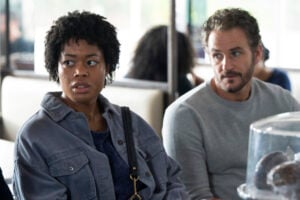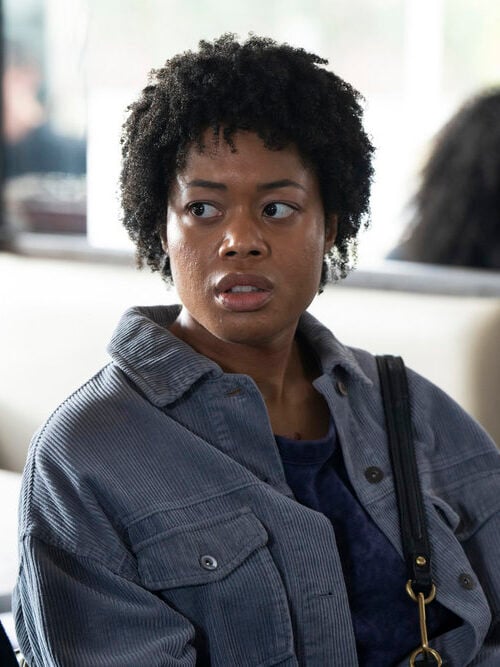Law & Order: SVU Season 26 Episode 7 Highlighted An Overlooked Community While Carisi Considered Going Vigilante


Law & Order: SVU has come a long way.
During the police procedural’s early days, the cops used to wonder if victims were prostitutes, and sex work cases were taken less seriously.
That changed a while ago, and now Law & Order: SVU Season 26 Episode 7 offers a look at some of the systemic issues that keep these victims from getting the justice they deserve when they are sexually assaulted.


Law & Order: SVU Season 26 Episode 7 Demonstrated That Keeping Sex Work Illegal Interferes With Getting Justice
Wallen didn’t trust the cops, nor did the other women that the SVU team had to talk to, and there was good reason for that.
Among other things, because sex work is illegal, the women were all convinced that cooperating with the cops meant walking into a trap.
They could be arrested for selling their bodies if they tried to help catch the rapist that had hurt several of them, and Wallen didn’t quite believe that Benson wouldn’t find a reason to charge her with a crime if she came to the station to tell them everything she knew.
Laws against prostitution are outdated for several reasons.
Besides the libertarian argument that it’s no one else’s business if someone wants to pay or offer payment for sex, there’s the issue that many sex workers are victims before they begin the job.
Many are trafficked and forced into sex, raped by pimps, or manipulated into sex work in exchange for a roof over their heads and food in their stomachs.
In Wallen’s case, this was the second time she’d been raped, or, at least, the second time Bruno caught a rape case involving her.
She might have been abused other times that she didn’t report.
She was more vulnerable than some of the other women doing sex work in that neighborhood because she was a lone wolf.
One interesting aspect of sex work that Law & Order: SVU Season 26 Episode 7 dived into was that many of the women involved formed a community where they looked out for one another, warned each other about problematic clients, and defended each other from people who tried to attack them.
People who are vulnerable often learn to do that, realizing that no one else will protect them, so they have to protect each other.
Of course, that doesn’t make it Wallen’s fault that she was attacked.
She should have been safe walking home after she finished what she was doing, but the fact that she didn’t have a community watching her back didn’t help anything.
Fin and Bruno Trying To Infiltrate The Community Led To One Of Law & Order: SVU Season 26 Episode 7’s Funniest Moments
Communities that protect themselves don’t trust outsiders, especially cops.
No matter how many times Fin said they weren’t Vice, there was no reason for the sex workers to believe them.
Vice cops will lie and say they don’t care that you’re a sex worker so they can lure you into a trap, after all.
The two of them negotiating a deal for information was amusing. I especially liked the look Bruno gave Fin when Fin told him to pay the women $250.
The Elephant In The Room: Race Issues
It would be irresponsible to ignore the fact that this was a community of Black and Latina sex workers.
Since I’m not a member of those communities, I don’t want to speak for them, but I’m sure that had something to do with why they didn’t trust cops and why they had formed their own community to protect themselves.
With all the racial tension between cops and communities of color, these women likely expected that they’d be treated more harshly than white sex workers might be.
I’d love to hear from people who have more knowledge about this than I do, though, so please feel free to jump into the comments with your perspective.
Has Carisi Gone Too Far In His Quest To Protect Jessie?
I love this Carisi plot, even though I’m not sure he had any business doing half of what he did.
Carisi returned to Benson’s office with news that he had tracked down the pedophile who was staring at Jessie on Law & Order: SVU Season 26 Episode 4 and learned that he worked in an elementary school.
Benson: This falls into a morally gray area of predictive policing.
Carisi: Sooner or later this guy is going to offend.
Benson: But he hasn’t yet. We’re not vigilantes, Carisi.
As a side note, I wish Benson would stop saying that she’s too busy to take on a particular case or cause. We all know she’s going to take it, so cut out the nonsense.
She did the same thing on Law & Order: SVU Season 26 Episode 6 when Agent Clay first told her about the case in Rockland County, only to acquiesce when she read the file.
What exactly is the point of that? She’s going to take the case. If she weren’t, there’d be no reason to bring it up.
Cottle hadn’t touched a child inappropriately and had no record, so he wasn’t on the sex offender registry, and nothing suspicious popped up on his background check, which is why Carisi wanted to take the law into his own hands.
Benson was right that this was a gray area.
The schools could be full of pedophiles who don’t act on their urges or haven’t done so yet; the only way to catch one is for them to offend.
That’s why part of protecting children needs to be teaching them red flags to watch out for and to report to adults right away.
No, children shouldn’t be solely responsible for their safety — adults need to do their part too.
However, information can be preventative, and I was surprised that Benson didn’t even consider that when Carisi asked her what she would do if Noah were in a school with a guy who had been known to stare at young children.
It seemed to me that Carisi was risking a lawsuit, and no matter how right he was, this guy was problematic.
He didn’t have hard evidence that the guy was going to hurt anyone, and following him around and reporting him to his employer so that he gets fired seems like it could be construed as harassment.
Additionally, Carisi was so hyperfocused on this that he considered his actual job a distraction, which is a problem.
Law & Order: SVU Season 26 Episode 7 took a strange turn when Cottle came to the SVU department to complain about Carisi’s behavior and ended up admitting he wanted help getting rid of urges toward young children.
Carisi’s response was to try to find a way to preventatively arrest him, which was silly. There was no charge that would stick because the man hadn’t touched a child inappropriately or tried to.
He wasn’t a child molester yet. He was a guy with inappropriate urges that scared him.
I don’t have any more love for pedophiles than Carisi does, but isn’t getting someone help who wants it a preventative measure?
Problems like inappropriate sexual urges are complicated and probably have a physiological as well as a psychological basis.
Molesting children is illegal and should stay that way, but having the urge to do it isn’t the same as doing it any more than Carisi’s desire to murder the guy means he’s a killer.
This guy was the rare pedophile who wanted to learn what to do so that he would never hurt a child, and that should be encouraged, not punished.
Over to you, SVU fanatics.
What did you think of Law & Order: SVU Season 26 Episode 7?
Vote in our poll to rank the episode, and then hit the comments with your thoughts.
Rate Law & Order: SVU Season 26 Episode 7!
Law & Order: SVU Season 26 airs on NBC on Thursdays at 9/8c and on Peacock on Fridays.
Watch Law & Order: SVU Online
The post Law & Order: SVU Season 26 Episode 7 Highlighted An Overlooked Community While Carisi Considered Going Vigilante appeared first on TV Fanatic.
Source: TV Fanatic
Recent Posts
The EU is betraying its citizens and weakening privacy for political gain
Maybe Apple will never fully walk away from Europe, but the European Commission has just…
Warner Bros.’ Shelved Coyote vs. Acme Feature May Get a Second Chance
A new report says Ketchup Entertainment, which picked up The Day the Earth Blew Up:…
Used Car of the Day: 1968 Ford Mustang
We're staying old school today with this 1968 Ford Mustang. This one has had the…
Trump Threatens to Defund the NYC Subway
Transportation Secretary Sean Duffy is demanding a "safety plan" from the city.
Apple will launch new ‘homeOS’ this year, here’s what’s coming
Apple has a big software year ahead, with major redesigns coming to iOS 19, macOS…
Elon Musk Is Joining Microsoft in $30 Billion Data Center Project
The biggest backer of OpenAI, Microsoft is now building its own AI models and teaming…